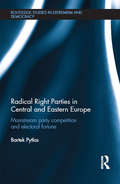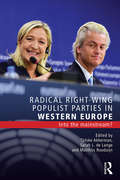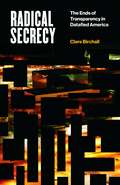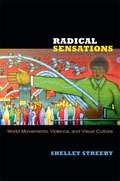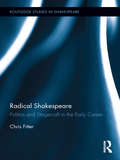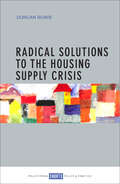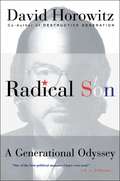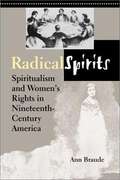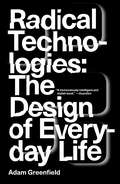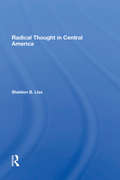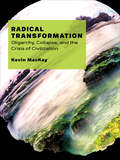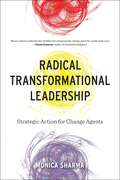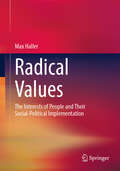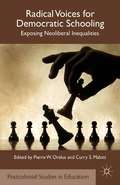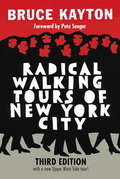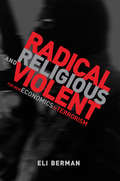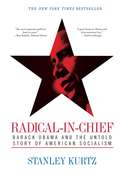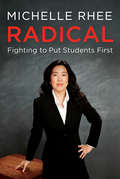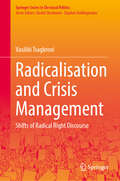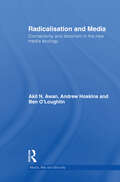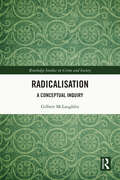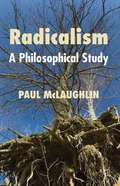- Table View
- List View
Radical Right Parties in Central and Eastern Europe: Mainstream Party Competition and Electoral Fortune (Extremism and Democracy)
by Bartek PytlasIn Central and Eastern Europe, radical right actors significantly impact public debates and mainstream policy agenda. But despite this high discursive influence, the electoral fortune of radical right parties in the region is much less stable. It has been suggested that this may be due to the fact that mainstream competitors increasingly co-opt issues which are fundamental for the radical right. However, the extent to which such tactics play a role in radical right electoral success and failure is still a subject for debate. This book is the first to provide a systematic theoretical framework and in-depth empirical research on the interaction between discursive influence, party competition and the electoral fortune of radical right parties in Central and Eastern Europe. It argues that in order to fully explain the impact of mainstream party strategies in this regard, it is vital to widen the analysis beyond competition over issues themselves, and towards their various legitimizing narratives and frame ownership. Up-to-date debates over policies of collective identity (minority, morality and nationalizing politics) in Hungary, Poland, and Slovakia serve as best cases to observe these under-researched phenomena. The analytical model is evaluated comparatively using original, primary data combined with election studies and expert surveys. Advancing an innovative, fine-grained approach on the mechanisms and effects of party competition between radical right and mainstream parties, this book will be of interest to students and scholars researching the far right and European party politics, as well as political contestation and framing.
Radical Right-Wing Populist Parties in Western Europe: Into the Mainstream? (Extremism and Democracy)
by Tjitske Akkerman Sarah L. de Lange Matthijs RooduijnRadical right-wing populist parties, such as Geert Wilders’ Party for Freedom, Marine Le Pen’s National Front or Nigel Farage’s UKIP, are becoming increasingly influential in Western European democracies. Their electoral support is growing, their impact on policy-making is substantial, and in recent years several radical right-wing populist parties have assumed office or supported minority governments. Are these developments the cause and/or consequence of the mainstreaming of radical right-wing populist parties? Have radical right-wing populist parties expanded their issue profiles, moderated their policy positions, toned down their anti-establishment rhetoric and shed their extreme right reputations to attract more voters and/or become coalition partners? This timely book answers these questions on the basis of both comparative research and a wide range of case studies, covering Austria, Belgium, Denmark, Finland, France, the Netherlands, Norway, Switzerland, and the United Kingdom. Analysing the extent to which radical right-wing populist parties have become part of mainstream politics, as well as the factors and conditions which facilitate this trend, this book is essential reading for students and scholars working in European politics, in addition to anyone interested in party politics and current affairs more generally.
Radical Secrecy: The Ends of Transparency in Datafied America (Electronic Mediations #60)
by Clare BirchallReimagining transparency and secrecy in the era of digital data When total data surveillance delimits agency and revelations of political wrongdoing fail to have consequences, is transparency the social panacea liberal democracies purport it to be? This book sets forth the provocative argument that progressive social goals would be better served by a radical form of secrecy, at least while state and corporate forces hold an asymmetrical advantage over the less powerful in data control. Clare Birchall asks: How might transparency actually serve agendas that are far from transparent? Can we imagine a secrecy that could act in the service of, rather than against, a progressive politics? To move beyond atomizing calls for privacy and to interrupt the perennial tension between state security and the public&’s right to know, Birchall adapts Édouard Glissant&’s thinking to propose a digital &“right to opacity.&” As a crucial element of radical secrecy, she argues, this would eventually give rise to a &“postsecret&” society, offering an understanding and experience of the political that is free from the false choice between secrecy and transparency. She grounds her arresting story in case studies including the varied presidential styles of George W. Bush, Barack Obama, and Donald Trump; the Snowden revelations; conspiracy theories espoused or endorsed by Trump; WikiLeaks and guerrilla transparency; and the opening of the state through data portals.Postsecrecy is the necessary condition for imagining, finally, an alternative vision of &“the good,&” of equality, as neither shaped by neoliberal incarnations of transparency nor undermined by secret state surveillance. Not least, postsecrecy reimagines collective resistance in the era of digital data.
Radical Sensations: World Movements, Violence, and Visual Culture
by Shelley StreebyThe significant anarchist, black, and socialist world-movements that emerged in the late nineteenth century and early twentieth adapted discourses of sentiment and sensation and used the era's new forms of visual culture to move people to participate in projects of social, political, and economic transformation. Drawing attention to the vast archive of images and texts created by radicals prior to the 1930s, Shelley Streeby analyzes representations of violence and of abuses of state power in response to the Haymarket police riot, of the trial and execution of the Chicago anarchists, and of the mistreatment and imprisonment of Ricardo and Enrique Flores Magón and other members of the Partido Liberal Mexicano. She considers radicals' reactions to and depictions of U. S. imperialism, state violence against the Yaqui Indians in the U. S. -Mexico borderlands, the failure of the United States to enact laws against lynching, and the harsh repression of radicals that accelerated after the United States entered the First World War. By focusing on the adaptation and critique of sentiment, sensation, and visual culture by radical world-movements in the period between the Haymarket riots of 1886 and the deportation of Marcus Garvey in 1927, Streeby sheds new light on the ways that these movements reached across national boundaries, criticized state power, and envisioned alternative worlds.
Radical Shakespeare: Politics and Stagecraft in the Early Career (Routledge Studies in Shakespeare)
by Chris FitterThis book argues that Shakespeare was permanently preoccupied with the brutality, corruption, and ultimate groundlessness of the political order of his state, and that the impact of original Tudor censorship, supplemented by the relatively depoliticizing aesthetic traditions of later centuries, have together obscured the consistent subversiveness of his work. Traditionally, Shakespeare’s political attitudes have been construed either as primarily conservative, or as essays in richly imaginative ambiguation, irreducible to settled viewpoints. Fitter contends that government censorship forced superficial acquiescence upon Shakespeare in establishment ideologies — monarchic, aristocratic and patriarchal — that were enunciated through rhetorical set pieces, but that Shakespeare the dramatist learned from Shakespeare the actor a variety of creative methods for sabotaging those perspectives in performance in the public theatres. Using historical contextualizations and recuperation of original performance values, the book argues that Shakespeare emerged as a radical writer not in middle age with King Lear and Coriolanus — plays whose radicalism is becoming widely recognized — but from his outset, with Henry VI and Taming of the Shrew. Recognizing Shakespeare’s allusiveness to 1590s controversies and dissident thought, and recovering the subtextual politics of Shakespeare’s distinctive stagecraft reveals populist, at times even radical meaning and a substantially new, and astonishingly interventionist, Shakespeare.
Radical Social Change in the United States: Badiou's Apostle and the Post-Factual Moment
by Joanna SwangerThis book tackles the question of why the United States is so resistant to radical change towards economic justice and peace. Taking full stock of the despair that launched the popular support for Bernie Sanders and Donald Trump, Swanger historicizes the political paralysis of post-1974 United States that deepened already severe economic inequalities, asking how the terrain for social movements in the early twenty-first-century US differs from that of the 1960s. This terrain is marked by the entrenchment of neoliberalism, anti-intellectualism, and difficulties paradoxically posed by the ease of social media. Activists now must contend with a paralyzing “post-factual” moment. Alain Badiou’s thought informs this book on breaking through contemporary political paralysis.
Radical Solutions to the Housing Supply Crisis
by Duncan BowieAs housing supply in England reaches crisis point, Duncan Bowie provides a critical review of housing policy under successive UK governments. From Blair’s New Labour and Cameron’s Coalition government to the 2016 Housing and Planning Act, Bowie demonstrates how successive governments have failed to provide adequate, affordable housing, leading to a chronic lack of provision. Exploring the inter-relationship between housing, planning and land policies, Bowie puts forward a reform programme based on an alternative set of policy priorities and delivery mechanisms, arguing the case for an integrated approach on land, taxation, planning and public investment to provide radical solutions to a growing crisis.
Radical Son: A Generational Oddysey
by David HorowitzOriginally a radical socialist, the current driving force behind the rise of the Hollywood right recounts how he moved from one set of political convictions to another over the course of thirty years, and challenges readers to consider how they came by their own convictions.
Radical Son: A Generational Odyssey
by David HorowitzDavid Horowitz was one of the founders of the New Left and an editor of Ramparts, the magazine that set the intellectual and revolutionary tone for the movement. From his vantage point at the center of the action, he provides vivid portraits of people who made the radical decade: world-famous philosopher Bertrand Russell, who in his nineties became America's scourge, organizing a War Crimes Tribunal over the war in Vietnam; Tom Hayden, the radical Everyman who promoted guerrilla warfare in America's cities in the Sixties and became a Democratic state senator when his revolutions failed; and Huey Newton, a street hustler and murderer who founded the most celebrated radical group of the Sixties, the Black Panthers. A brutal murder committed by the Panthers prompted Horowitz's profound "second thoughts" that eventually transformed him into an intellectual leader of conservatism and its most prominent activist in Hollywood.
Radical Spirits: Spiritualism and Women's Rights in Nineteenth-Century America
by Ann Braude"Radical Spirits" is a landmark in the history of women's political activism and in the history of women and religion in America. Ann Braude proposes that the engagement of women in the Spiritualist movement not only provided a religious alternative to male-dominated mainstream religions, but also gave women a social and political voice. For some women, Spiritualism and the early women's rights movement went hand in hand. While feminist historians continue to view world religion as the enemy of women's emancipation, historians of religion see signs of feminism in women's religious activities.
Radical Technologies: The Design of Everyday Life
by Adam GreenfieldA field manual to the technologies that are transforming our livesEverywhere we turn, a startling new device promises to transfigure our lives. But at what cost? In this urgent and revelatory excavation of our Information Age, leading technology thinker Adam Greenfield forces us to reconsider our relationship with the networked objects, services and spaces that define us. It is time to re-evaluate the Silicon Valley consensus determining the future. We already depend on the smartphone to navigate every aspect of our existence. We’re told that innovations—from augmented-reality interfaces and virtual assistants to autonomous delivery drones and self-driving cars—will make life easier, more convenient and more productive. 3D printing promises unprecedented control over the form and distribution of matter, while the blockchain stands to revolutionize everything from the recording and exchange of value to the way we organize the mundane realities of the day to day. And, all the while, fiendishly complex algorithms are operating quietly in the background, reshaping the economy, transforming the fundamental terms of our politics and even redefining what it means to be human. Having successfully colonized everyday life, these radical technologies are now conditioning the choices available to us in the years to come. How do they work? What challenges do they present to us, as individuals and societies? Who benefits from their adoption? In answering these questions, Greenfield’s timely guide clarifies the scale and nature of the crisis we now confront —and offers ways to reclaim our stake in the future.
Radical Thought In Central America
by Sheldon B LissCentral American pensadores have interpreted the theories of Marx and other scholars of revolution in diverse ways. In this book Sheldon Liss examines the political theory and ideology of some of Central America's most important radical thinkers, including non-Marxists, and demonstrates how they have challenged the tenets of imperialism and capitalism. Chapters on individual Central American countries begin with brief historical introductions that emphasize the rise of radical activities and organizations. Individual essays based on published writings, interviews, and scholarly analyses of their works then establish each writer's personal ideology, social and political goals, and theories of society, state, and institutions of power. Liss also examines their relationship to social and political movements and contributions to the national intellectual life of the past and present. In addition, Liss discusses the writers' understanding of the role of the United States in the Americas and beliefs about national struggles for independence. By focusing on political and social theory and on intellectual history, this book also provides the background critical for understanding recent developments and changes in Central America.
Radical Transformation: Oligarchy, Collapse, and the Crisis of Civilization
by Kevin MacKayRadical Transformation is a story about industrial civilization’s impending collapse, and about the possibilities of averting this fate. Human communities first emerged as egalitarian, democratic groups that existed in symbiotic relationship with their environments. Increasing complexity led to the emergence of oligarchy, in which societies became captive to the logic of domination, exploitation, and ecological destruction. The challenge facing us today is to build a movement that will radically transform civilization and once more align our evolutionary trajectory in the direction of democracy, equality, and ecological sustainability.
Radical Transformational Leadership: Strategic Action for Change Agents
by Monica SharmaMonica Sharma describes how we can source our inner capacities and wisdom to manifest change that embodies universal values such as dignity, compassion, fairness, and courage. Drawing on more than twenty years of work for the United Nations and elsewhere, she presents a radical new approach to transformational leadership, one that creates systems of change where everyone can engage—not just analysts and policy-makers. Demonstrating that we all can be architects of a new humanity, Monica demystifies policy-making, planning, and implementation so that everyone can play an informed and strategic part in eradicating the world’s most intractable problems. Using real-life examples from around the world, she shows how our innate characteristics of universal compassion, equity impulse, and human capability can create new patterns that effectively address major challenges such as gross inequality, unbridled hate, conflicts based on social identity, and the never-enough mindset of greed. Written in a straightforward, accessible style, Radical Transformational Leadership outlines a path-breaking paradigm shift that is already generating equitable and sustainable results across the globe.
Radical Values: The Interests of People and Their Social-Political Implementation
by Max HallerA famous and frequently quoted sentence by Max Weber states: &“Interests, not ideas, directly govern the actions of people. However, the &‘worldviews&’ created by &‘ideas&’ have often determined the paths in which the dynamics of interests propelled action.&” Recent sociology, however, has not done justice to this principle. Values and their effects are either assumed to be given (as in the case of Talcott Parsons) or considered entirely irrelevant (as in Rational Choice and System Theory). Extensive empirical research on values has yielded many results but has largely lacked a theoretical foundation, making its findings often contestable. Weber himself provided only unsatisfactory answers regarding the relevance of values: The decision for specific values is a purely individual matter, and there is an irreconcilable struggle between different values. This book comprehensively examines this issue for the first time in sociology and finds a new, constructive, and explanatory solution - drawing on authors such as Immanuel Kant, George H. Mead, and Raymond Boudon. It is utilizing considerations from philosophy, social theory, and empirical social research, as well as incorporating historical struggles for the recognition and enforcement of values. It can be determined that there are fundamental societal values, that their number can be clearly defined, and that there is not necessarily conflict between them, but rather complementarity. With these theses and findings, this book can be regarded as a new sociological standard work. It is also of fundamental importance for students and researchers in many other humanities and social science disciplines.
Radical Voices for Democratic Schooling: Exposing Neoliberal Inequalities (Postcolonial Studies in Education)
by P. Orelus C. MalottComprised of in-depth interviews and conversations with key figures in education and activism that thoroughly examine the intersection of neoliberalism, neocolonialism, and racism, this first-rate collection critically explores, through their teaching, various, important issues situated in the context of Western neoliberalism and neocolonialism.
Radical Walking Tours of New York City, Third Edition
by Bruce KaytonToo often, tours of New York City are paeans to power--extolling the fabled New York skyline and the robber barrons whose wealth built it up, praising the marvels of a city built largely on finance. But New York has also, since its founding, been a city of struggle, a place where workers lived, created wealth, and spun out the rich cultural tapestry that has put the small island of Manhattan at the very center of the world's imagination. It is a city of proletarian uprising, of abolitionist rebellion, of civil rights demonstrations, and radical futures. This is Bruce Kayton's New York, the town of Emma Goldman and Langston Hughes, of Margaret Sanger and John Reed, of demonstrations and shootouts, of community gardens and marches. Now in an expanded third edition with a new Upper West Side tour featuring the Berrigans, Maxim Gorky, Lucien Carr and others, and updated sites reflecting recent anti-war and police-brutality protests, Occupy Wall Street and Zuccotti Park, and more, these thirteen walking tours, taking us from Battery Park to Harlem, from the Lower East Side to Central Park, offer a vital new perspective on the history of New York City and its place in the traditions of American radicalism.From the Trade Paperback edition.
Radical, Religious, and Violent: The New Economics of Terrorism
by Eli BermanApplying fresh tools from economics to explain puzzling behaviors of religious radicals: Muslim, Christian, and Jewish; violent and benign. How do radical religious sects run such deadly terrorist organizations? Hezbollah, Hamas, Lashkar-e-Taiba, and the Taliban all began as religious groups dedicated to piety and charity. Yet once they turned to violence, they became horribly potent, executing campaigns of terrorism deadlier than those of their secular rivals. In Radical, Religious, and Violent, Eli Berman approaches the question using the economics of organizations. He first dispels some myths: radical religious terrorists are not generally motivated by the promise of rewards in the afterlife (including the infamous seventy-two virgins) or even by religious ideas in general. He argues that these terrorists (even suicide terrorists) are best understood as rational altruists seeking to help their own communities. Yet despite the vast pool of potential recruits—young altruists who feel their communities are repressed or endangered—there are less than a dozen highly lethal terrorist organizations in the world capable of sustained and coordinated violence that threatens governments and makes hundreds of millions of civilians hesitate before boarding an airplane. What's special about these organizations, and why are most of their followers religious radicals? Drawing on parallel research on radical religious Jews, Christians, and Muslims, Berman shows that the most lethal terrorist groups have a common characteristic: their leaders have found a way to control defection. Hezbollah, Hamas, and the Taliban, for example, built loyalty and cohesion by means of mutual aid, weeding out “free riders” and producing a cadre of members they could rely on. The secret of their deadly effectiveness lies in their resilience and cohesion when incentives to defect are strong. These insights suggest that provision of basic social services by competent governments adds a critical, nonviolent component to counterterrorism strategies. It undermines the violent potential of radical religious organizations without disturbing free religious practice, being drawn into theological debates with Jihadists, or endangering civilians.
Radical-in-Chief: Barack Obama and the Untold Story of American Socialism
by Stanley KurtzPresident Barack Obama surprised many voters during a pre-election interview when he approvingly noted that Ronald Reagan had "changed the trajectory of America" in a way that other presidents had not. In effect, Obama was saying that he, too, aimed to transform America in some fundamental way. Yet while Americans in 1982 may have been divided over Reagan's politics, at least they knew what he stood for. Do we really understand Obama's vision for our country? In his controversial new book, veteran journalist Stanley Kurtz culls together two years of investigations from archives and never-before-tapped sources to present an exhaustively-researched exposÉ of President Obama's biggest secret--the socialist convictions and tactical ruthlessness he has long swept under the rug. A personable figure, a thoughtful politician, and an inspiring orator, Obama has hidden his core political beliefs from the American people--sometimes by directly misrepresenting his past and sometimes by omitting or parceling out damaging information to disguise its real importance. The president presents himself as a post-ideological pragmatist, yet his current policies grow directly from the nexus of socialist associates and theories that has shaped him throughout his adult life. Kurtz makes an in-depth exploration of the president's connections to radical groups such as ACORN, UNO of Chicago, the Midwest Academy, and the Socialist Scholars Conferences. He explains what modern "stealth" socialism is, how it has changed, and how it continues to influence the Democratic Party. He sheds light on what the New York Times called a "lost chapter" of the president's life--his years at Columbia--and proves that Obama's youthful infatuation with socialism was not just a phase. Those ideas have shaped his political views and set the groundwork for the long-term strategy of his administration. It could be argued that Obama's past no longer matters, but, in a sense, it matters more than the present. Obama has adopted the gradualist socialist strategy of his mentors, seeking to combine comprehensive government regulation of private businesses with a steadily enlarging public sector. Eventually, in his hands, capitalist America could resemble a socialist-inspired Scandinavian welfare state. The gap between inner conviction and public relations in Obama's case is vastly wider than for most American politicians. If Americans understood in 2008 the facts Kurtz reveals in this shocking political biography, Obama would not be president today. The fears of his harshest critics are justified: our Commander-in- Chief is a Radical-in-Chief.
Radical-in-Chief: Barack Obama and the Untold Story of American Socialism
by Stanley KurtzAn in-depth examination of President Barack Obama and his policies by journalist and political commentator Stanley Kurtz.
Radical: Fighting to Put Students First
by Michelle RheeIn Radical, Michelle Rhee, a fearless and pioneering advocate for education reform, draws on her own life story and delivers her plan for better American schools.Rhee’s goal is to ensure that laws, leaders, and policies are making students—not adults—our top priority, and she outlines concrete steps that will put us on a dramatically different course. Informing her critique are her extraordinary experiences in education: her years of teaching in inner-city Baltimore; her turbulent tenure as chancellor of the Washington, DC public schools; and her current role as CEO of the education nonprofit StudentsFirst. Rhee draws on dozens of compelling examples from schools she’s worked in and studied, from students who’ve left behind unspeakable home lives and thrived in the classroom to teachers whose groundbreaking methods have produced unprecedented leaps in student achievement.An incisive and intensely personal call-to-arms, Michelle Rhee’s Radical is required reading for anyone who seeks a guide to not only the improvement of our schools, but also a brighter future for America’s children.
Radicalisation and Crisis Management: Shifts of Radical Right Discourse (Springer Series in Electoral Politics)
by Vasiliki TsagkroniThis book discusses theories of crisis management and the radical right, to shed light on how responses to crisis influence radical right parties in their presence, discourse, and evolution. The book offers a comparative perspective by examining case studies with various traditions of radical right actors, presenting data on how crisis exploitation can assist in exploring, reconsidering, bargaining, and learning about the prospects of change of political parties. The book focuses on the debate on radicalization and crisis management. Similar to the already existing economic, political, post-Brexit, and migration crises in Europe, discourses of fear around the latest health crisis are paving the way for further radicalised discourse from the far right. The book looks into how radical right parties in Europe have responded to these crises. It monitors and explores how crisis exploitation impacts political strategies, opportunity-seeking behaviours, and the evolution of the discourse of radical right parties in the contemporary political landscape. Therefore, this book is a must-read for researchers, students, and policy-makers, interested in a better understanding of populism, radical right parties, electoral studies, as well as comparative politics in general.
Radicalisation and Media: Connectivity and Terrorism in the New Media Ecology (Media, War and Security)
by Andrew Hoskins Ben O'Loughlin Akil AwanThis book examines the circulation and effects of radical discourse by analysing the role of mass media coverage in promoting or hindering radicalisation and acts of political violence. There is a new environment of conflict in the post-9/11 age, in which there appears to be emerging threats to security and stability in the shape of individuals and groups holding or espousing radical views about religion, ideology, often represented in the media as oppositional to Western values. This book asks what, if anything is new about these radicalising discourses, how and why they relate to political acts of violence and terror, and what the role of the mass media is in promoting or hindering them. This includes exploring how the acts themselves and explanations for them on the web are picked up and represented in mainstream television news media or Big Media, through the journalistic and editorial uses of words, phrases, graphics, images, and videos. It analyses how interpretations of the term 'radicalisation' are shaped by news representations through investigating audience responses, understandings and misunderstandings. Transnational in scope, this book seeks to contribute to an understanding of the connectivity and relationships that make up the new media ecology, especially those that appear to transcend the local and the global, accelerate the dissemination of radicalising discourses, and amplify media/public fears of political violence. This book will be of interest to students of security studies, media studies, terrorism studies, political science and sociology.
Radicalisation: A Conceptual Inquiry (Routledge Studies in Crime and Society)
by Gilbert McLaughlinRadicalisation is a conceptual investigation within Western liberal democratic societies that follows an analytical framework linking expertise theory to discourse analysis of publications from the academic, governmental, and non-governmental spheres, as well as a dozen interviews with experts in the field. The reader will come to understand the socio-political configurations that led to the emergence of radicalisation as an object of study. The book also identifies the historical tensions regarding models, definitions, and operationalisation of the concept of radicalisation in social sciences research. Finally, a new model explaining how the term radicalisation became the central conceptual framework of a new field of expertise will be proposed. The book is situated within the fields of security studies, crime prevention, and sociology of expertise. The book is innovative in its distinct focus on the term radicalisation and the expertise thereof. With its diachronic and synthetical approach, the book also serves as an entry point for all researchers and practitioners seeking an introduction to the subject of radicalisation and violent extremism. The book addresses the debates among academics, public experts, and policymakers into the origin, dissemination, and maintenance of the field of expertise. Thus, the aim is not so much to uncover the 'true' meaning of the term as to understand how it has been socially constructed, this book will be of great interest to students and scholars of criminology, security studies, and sociology.
Radicalism
by Paul MclaughlinConfusion, controversy and even fear surrounds the political phenomenon of radicalism. This book attempts to make conceptual and historical sense of this phenomenon, both as a kind of practice and as a kind of thought, before defending it in a traditional if unfashionable form: a form that is historically progressive and politically humanistic.
